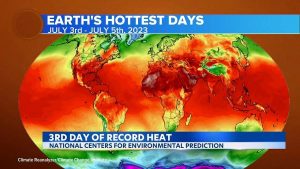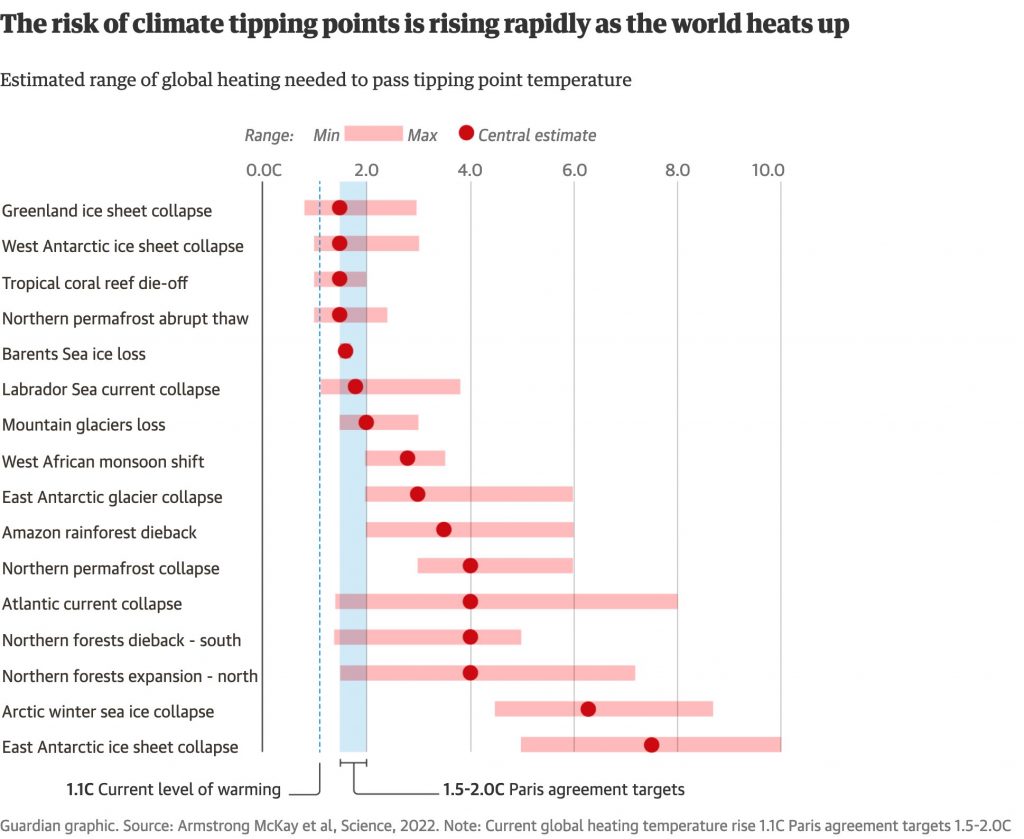Ecological Tipping Points: Eyes Wide Open
Jul 10th, 2023 | By admin | Category: Climate ChangeBy Suzanne York.
Does it seem that dire climate and environmental news is everywhere right now? Could we be at a tipping point and possibly crossing irreversible planetary thresholds? Ironically, this could be happening at the same time as awareness of these issues amongst the general public is on the rise.
All of a sudden major media outlets are all over this, leading (hopefully) to a better understanding of what’s happening, and at the same time, perpetuating many people’s fear.
A tipping point is a critical threshold that, when crossed, leads to large and often irreversible changes in the climate system. Below are some of the main tipping points of concern:
The Earth’s hottest days on record just occurred July 3-5 and this past June was the warmest ever recorded. The world is on track to have the hottest year ever recorded in modern history.
Per the New York Times:
Already, the surge has been striking. The planet just experienced its warmest June ever recorded, researchers said, with deadly heat waves scorching Texas, Mexico and India. Off the coasts of Antarctica, sea ice levels this year have plummeted to record lows.
And in the North Atlantic, the ocean has been off-the-charts hot. Surface temperatures in May were 2.9 degrees Fahrenheit, or 1.6 degrees Celsius, warmer than typical for this time of year, breaking previous records by an unusually large margin.
Brian McNoldy, a senior research scientist at the University of Miami, told the New York Times, “It’s so far out of line of what’s been observed that it’s hard to wrap your head around… It doesn’t seem real.”
But it is real. Last month, a study published in Nature Sustainability found that ecological collapse is likely to begin sooner than previously expected. The researchers warned that more than a fifth of ecosystems worldwide, including the Amazon rainforest, are at risk of a catastrophic breakdown within a human lifetime(emphasis added).
There are positive developments happening, but the concern is that it’s too little, too late, and we are running out of time. Renewable energy, electric cars, plant-based alternatives, vertical farming, etc. should’ve been in place decades ago. Yet act we must.
Truly lasting and sustainable solutions also require more of us. Humans do not live in balance with the rest of Earth’s creatures. Many people seem to expect to have an entitled life without much sacrifice. Little thought, if any, is expended on co-existing with Nature. But until we live in balance and respect all life on Earth – and as long as we keep pushing past ecological tipping points – the main solutions aren’t likely to make a difference anytime soon.
Author David Korten, a longtime globalization activist, recently published his priorities for a viable human future. This, or something similar, is what is needed to prevent ecological collapse.
Per Korten:
A viable human future requires the rapid navigation of deep transformation to restore Earth’s health and equitably distribute Earth’s natural surplus. It will rest on recognition and embrace of these tragically forgotten foundational truths:
- Life, the sacred product of Earth’s commons, is the source of our being.
- Money is a number with no utility or meaning beyond the human mind.
- There will be no winners on a dead Earth.
- We will prosper in the pursuit of life, or we will perish in the pursuit of money.
- The choice is ours to make.
Korten goes on to list three key priorities for action (abbreviated here):
Priority Number 1: Earth First. We must learn to share and care for the living Earth commons. We have an inherent responsibility to care for it. None among us has a right to monopolize or attempt to control it.
Priority Number 2: Humans follow Earth. We must facilitate Earth’s healing and assure that its gifts are equitably shared in support of life’s continued evolutionary unfolding.
Priority Number 3: Institutions follow Humans. Human institutions are human creations that guide us in our relationships with one another and Earth. Our current institutions are guiding us to self-extinction, which does not serve. We have the right and means to eliminate or change them.
Korten has hit upon the necessary change in attitude and behavior that needs to take place to transform the planet. Humanity as a whole must learn to care for the Earth and all living beings, and to live in harmony with the planet. These are not just words or pie in the sky ideals of environmentalists. This is serious, and humans ignore the web of life to our own peril. We cannot keep taking what we want without consequences, for us and for future generations. It should finally be obvious to anyone only remotely paying attention. We are all in this together.



